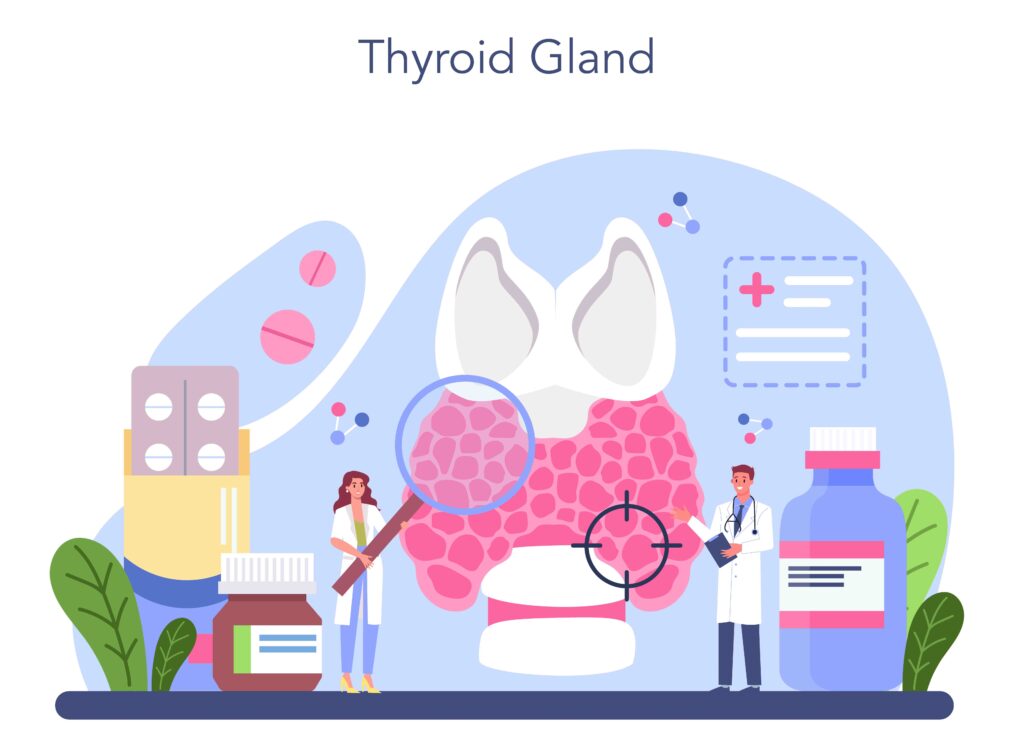Are you tired of feeling constantly fatigued, experiencing unexplained weight changes, or battling mood swings? Time to take control of your health and understand the often-misunderstood world of thyroid symptoms in women. Whether you’re a young woman or in the prime of your life, this blog post is here to guide you through identifying and managing those pesky thyroid issues that can wreak havoc on our bodies. Buckle up as we delve into the realm of hormones and explore effective strategies for navigating through thyroid symptoms – because every woman deserves to feel her absolute best!
Introduction to Thyroid symptoms in women & their Health

Thyroid gland is a small, butterfly-shaped organ located in the neck. Despite its size, it plays a critical role in the overall functioning of our body, especially for women. The thyroid gland produces hormones that regulate metabolism, growth and development, energy levels, and body temperature. These hormones are also essential for maintaining a healthy heart rate, blood pressure, and menstrual cycle.
It is estimated that around 20 million Americans have some form of thyroid disorder, with women being five to eight times more likely to develop it than men. This is because several factors such as hormonal changes during puberty, pregnancy, and menopause can affect the thyroid gland’s function.
There are two most common types of thyroid disorders are hypothyroidism (underactive thyroid) and hyperthyroidism (overactive thyroid). In hypothyroidism, the thyroid gland does not produce enough hormones, while in hyperthyroidism it produces an excess amount of hormones. Both conditions can cause a wide range of symptoms that can significantly impact a woman’s physical and emotional well-being.
Some common thyroid symptoms in women include fatigue, weight gain or difficulty losing weight, dry skin and hair loss, sensitivity to cold temperatures, irregular periods or heavy bleeding during periods. On the other hand, an overactive thyroid may present with symptoms like rapid heart rate or palpitations, unexplained weight loss or difficulty gaining weight despite increased appetite, heat intolerance, muscle weakness, anxiety or irritability, frequent bowel movements.
While some symptoms may overlap between these two conditions due to their effect on hormone levels in the body, there are also some distinct differences that can help differentiate between them. It is important for women to be aware of these symptoms, so they can recognize any changes in their bodies early on and seek proper medical attention.
Moreover, untreated or poorly managed thyroid disorders can lead to various health complications such as infertility, heart disease, and osteoporosis. This is why it is crucial for women to pay attention to their thyroid health and seek medical advice if they experience any symptoms.
In the upcoming sections of this blog series, we will dive deeper into the signs and symptoms of thyroid disorders in women and discuss ways to manage them effectively. By understanding the importance of the thyroid gland to women’s health, we can take better care of ourselves and live a healthier life.
Common Thyroid Symptoms in Women
Thyroid disorders are fairly common in women, affecting approximately 12% of the female population. This small, butterfly-shaped gland located in the neck is responsible for producing hormones that regulate metabolism and energy levels. When the thyroid gland malfunctions, it can lead to a variety of physical and emotional symptoms that can significantly impact daily life.
Here are some of the most common thyroid symptoms in women:
Fatigue and Weakness
Feeling constantly tired or weak is a hallmark symptom of an underactive thyroid, also known as hypothyroidism. This occurs when the thyroid gland produces insufficient amounts of hormones, leading to a slowdown in bodily functions.
Weight Changes
Unexplained weight gain or difficulty losing weight despite maintaining a healthy diet and exercise routine can be indicative of an underactive thyroid. On the other hand, sudden weight loss may signal an overactive thyroid (hyperthyroidism).
Hair Loss
Thyroid disorders often result in hair loss, as hair follicles become weaker due to hormonal imbalances. Women with hypothyroidism may experience thinning hair all over their scalp, while those with hyperthyroidism may notice excessive shedding.
Irregular Menstrual Cycles

Hormonal imbalances caused by thyroid disorders can also affect menstrual cycles, leading to irregular periods or heavy bleeding.
Mood Swings and Anxiety
The fluctuations in hormone levels associated with thyroid disorders can cause mood swings and anxiety in women. They may feel more irritable or anxious than usual without any apparent reason.
Muscle Aches and Joint Pain
Inflammation caused by an overactive immune system due to autoimmune thyroid diseases like Graves’ disease or Hashimoto’s disease can cause muscle aches and joint pain.
Trouble Sleeping
Insomnia is another common thyroid symptoms in women seen with hyperthyroidism as their increased metabolism makes it difficult for them to fall and stay asleep.
Changes in Skin and Nails
Dry, flaky skin, brittle nails, and changes in nail texture (such as ridges or separation from the nail bed) are all potential symptoms of a thyroid disorder.
Elevated Heart Rate
An overactive thyroid can lead to an increased heart rate, causing palpitations or irregular heartbeats.
It’s important to note that these symptoms can also be indicative of other health conditions. Thus, it’s essential to consult a healthcare professional for proper diagnosis and treatment if you experience any of these thyroid symptoms in women regularly. Untreated thyroid disorders can lead to serious health complications, so early detection and management are crucial for maintaining overall well-being.
Understanding the Different Types of Thyroid Disorders
The thyroid gland, located in the neck, plays a crucial role in regulating various bodily functions. However, it is susceptible to several disorders that can affect its functioning and cause a range of thyroid symptoms in women. In this section, we will discuss the different types of thyroid disorders and their characteristics.
Hypothyroidism
Hypothyroidism occurs when the thyroid gland does not produce enough hormones to meet the body’s needs. This leads to an underactive thyroid and can cause fatigue, weight gain, hair loss, dry skin, constipation, and depression. The most common cause of hypothyroidism is an autoimmune disorder called Hashimoto’s disease.
Hyperthyroidism
Hyperthyroidism is the opposite of hypothyroidism and occurs when there is an overproduction of thyroid hormones. This condition can cause symptoms such as rapid heartbeat, weight loss, nervousness, irritability, muscle weakness, and difficulty sleeping. Graves’ disease is the most common thyroid symptoms in women of hyperthyroidism.
Goiter
A goiter refers to an enlarged thyroid gland which can occur due to both hypothyroidism and hyperthyroidism or due to iodine deficiency in the diet. It may or may not be associated with other symptoms, but can be visible as a swelling in the neck.
Thyroid Nodules
Thyroid nodules are lumps that form within the thyroid gland which may be solid or filled with fluid. Most nodules are benign (non-cancerous), but some could be cancerous or become cancerous over time if left untreated.
Thyroiditis
Thyroiditis refers to inflammation of the thyroid gland caused by infection or autoimmune disorders such as Hashimoto’s disease or postpartum thyroiditis (occurring after childbirth). It can lead to temporary hyper- or hypothyroidism before returning to normal functioning.
Pituitary Thyroid Disorders
The pituitary gland, located at the base of the brain, produces thyroid-stimulating hormone (TSH) that tells the thyroid to produce hormones. If there is a problem with the pituitary gland, it can lead to an overproduction or underproduction of TSH and affect the thyroid’s functioning.
It is essential to understand these different types of thyroid disorders as they have specific causes, thyroid symptoms in women, and treatments. However, many individuals may experience a combination of symptoms from various disorders, making it challenging to diagnose accurately. Therefore, seeking medical advice and getting regular check-ups can help in identifying any underlying issues and managing them effectively.
Being aware of the various types of thyroid disorders can assist women in recognizing potential signs and symptoms and seeking timely treatment. It is crucial to consult a healthcare professional for proper diagnosis and management as each disorder has its unique characteristics and requires specific treatment approaches. With proper care and management, individuals with thyroid disorders can lead healthy lives.
Causes and Risk Factors for Thyroid Problems in Females
Thyroid problems are a common health issue that affects millions of women worldwide. The thyroid gland, located in the front of the neck, is responsible for producing hormones that regulate metabolism and other bodily functions. When this gland does not function properly, it can lead to various thyroid problems such as hypothyroidism, hyperthyroidism, goiter, or thyroid nodules.
There are several causes and risk factors that can contribute to the development of thyroid problems in females. Understanding these factors can help women recognize potential warning signs and take appropriate measures to manage their condition.
Hormonal Imbalances
Women are more prone to thyroid disorders due to hormonal changes throughout their lifetime. Pregnancy, menopause, and menstrual cycles can all affect the production of hormones from the thyroid gland and disrupt its normal functioning.
Autoimmune Disorders
Certain autoimmune diseases like Hashimoto’s disease or Graves’ disease cause the immune system targeting the thyroid gland, resulting in inflammation and harm.. These conditions are more prevalent in women than in men.
Iodine Deficiency
Iodine is an essential mineral required for proper functioning of the thyroid gland. A deficiency in iodine levels can lead to enlarged thyroids (goiter) or underactive thyroids (hypothyroidism).
Genetic Factors
Thyroid problems tend to run in families; hence there is a higher chance for women with a family history of thyroid disorders to develop them themselves.
Age
As women age, their risk of developing thyroid problems increases significantly. This could be because older adults often have underlying health conditions that may interfere with proper hormone regulation.
Radiation Exposure
Exposure to radiation therapy near the neck area or nuclear accidents can damage cells in the thyroid gland and increase one’s risk of developing cancerous growth in the gland.
Dietary Factors
Consuming too many soy-based products or cruciferous vegetables like broccoli, cabbage, and Brussels sprouts can interfere with the production of thyroid hormones.
Stress

Chronic stress can disrupt the body’s hormonal balance and negatively impact thyroid function.
It is essential for women to be aware of these risk factors and take proactive measures to prevent or manage thyroid problems. This may include maintaining a healthy lifestyle, eating a balanced diet rich in iodine, managing stress levels, and regularly monitoring their thyroid hormone levels through blood tests. It is also crucial for women to consult with their healthcare provider if they experience any thyroid symptoms in women related to thyroid problems such as weight changes, fatigue, hair loss, irregular menstrual cycles, or changes in mood or energy levels.
By understanding the causes and risk factors for thyroid problems in females, women can take control of their health and effectively manage any potential issues that may arise. With early detection and proper treatment, women can lead healthy lives while navigating through the complexities of thyroid disorders.
Diagnosis and Treatment Options for Thyroid Disorders
Thyroid disorders are often difficult to diagnose as the symptoms can be vague and may overlap with other health conditions. However, early diagnosis is crucial in managing these disorders and preventing potential complications. In this section, we will discuss the various diagnostic methods and treatment options available for thyroid disorders.
Diagnosis
The first step in diagnosing a thyroid disorder is a physical exam and thorough evaluation of the patient’s medical history. The doctor may also conduct blood tests to measure the levels of thyroid-stimulating hormone (TSH), thyroxine (T4) and triiodothyronine (T3) hormones. Abnormal levels of these hormones can indicate an overactive or underactive thyroid gland.
Imaging tests such as ultrasound, CT scan or MRI may also be recommended to get a better understanding of the size and structure of the thyroid gland. A radioactive iodine uptake test can help determine if there is any abnormality present in the functioning of the thyroid gland.
In some cases, a biopsy may be necessary where a small tissue sample is taken from the thyroid gland for further analysis. This is usually done when there are nodules present that require further examination to rule out any cancerous growth.
Treatment
The treatment approach for thyroid disorders depends on the type, severity, and underlying cause of the condition. The two main types of treatments available are medication therapy and surgery.
Medications
Most patients with hypothyroidism are prescribed synthetic hormones like levothyroxine which helps regulate hormone levels in their body. These medications need to be taken daily for life to manage symptoms effectively.
For hyperthyroidism, antithyroid drugs such as methimazole or propylthiouracil may be prescribed to reduce excessive production of hormones by attacking cells responsible for producing them.
Surgery
Surgery is only recommended in severe cases where there are large goiters or nodules that are causing difficulty in breathing, swallowing or speaking. In such cases, a partial or total thyroidectomy may be performed to remove all or part of the thyroid gland.
In addition to these conventional treatments, some patients may also opt for alternative therapies such as acupuncture, herbal remedies, and dietary changes to manage thyroid symptoms in women. However, it is important to consult with a healthcare professional before incorporating any alternative treatment into your regimen.
Timely diagnosis and appropriate treatment are essential in managing thyroid disorders effectively. It is crucial to work closely with your doctor and follow their recommendations for optimal management of your condition. With proper care and understanding of the disorder, women can lead healthy and fulfilling lives despite having a thyroid disorder.
Lifestyle Changes to Manage Thyroid symptoms in women
Aside from medical treatments, there are also various lifestyle changes that can help manage symptoms of thyroid disorders. These changes may include dietary modifications, stress management techniques, and regular exercise.
Diet
Dietary modifications play a crucial role in managing thyroid symptoms in women. Certain foods can either worsen or alleviate symptoms of thyroid disorders. For example, people with hypothyroidism should avoid goitrogenic foods such as broccoli, cauliflower, and cabbage as they can interfere with the absorption of thyroid medication.
On the other hand, incorporating more iodine-rich foods like seafood and dairy products can help improve symptoms of an underactive thyroid. In addition to these specific adjustments, it is also important for individuals with thyroid disorders to maintain a healthy and balanced diet. This includes consuming plenty of fruits and vegetables, lean protein sources, and whole grains while limiting processed foods high in sugar and unhealthy fats.
Stress Management
Stress has been shown to have a significant impact on the functioning of the thyroid gland. It is important for individuals with thyroid disorders to find ways to manage stress levels effectively. This can be achieved through activities such as yoga, meditation, deep breathing exercises or engaging in hobbies that promote relaxation.
Exercise
Regular physical activity is not only beneficial for overall health but also plays a role in managing thyroid symptoms in women. Exercise helps boost metabolism, which can be helpful for those with an underactive thyroid gland. It also promotes weight loss, which can improve symptoms associated with an overactive thyroid gland.
Sleep
Getting enough quality sleep is crucial for maintaining hormone balance and overall well-being in individuals with thyroid disorders. Inadequate sleep has been linked to increased production of cortisol (the stress hormone), which can negatively affect the functioning of the thyroid gland.
Avoid Smoking & Alcohol Consumption
Individuals with an overactive thyroid should steer clear of smoking as it increases heart rate and blood pressure, which can worsen thyroid symptoms in women. Alcohol consumption should also be limited as it interferes with the metabolism of thyroid hormones.
Making these lifestyle changes can help individuals better manage their thyroid symptoms in women. It is crucial to seek advice from a healthcare professional before making any significant changes dietary or exercise modifications, especially for those taking medication for their thyroid disorder. By incorporating these lifestyle changes into your daily routine, you may experience improved overall health and well-being while managing thyroid symptoms in women more effectively.
Coping with Emotional and Psychological Effects of Thyroid Disorders
Thyroid disorders not only affect the physical health of a person, but they can also have a significant impact on their emotional and psychological well-being. The thyroid gland plays a crucial role in regulating hormones that control our mood, energy levels, and overall mental health. Therefore, it is not uncommon for those with thyroid disorders to experience emotional and psychological symptoms.
One of the most common emotional effects of thyroid disorders is mood swings. Fluctuations in hormone levels can cause sudden changes in emotions, leading to feelings of irritability, anxiety, or depression. Individuals may also experience difficulty concentrating or making decisions due to brain fog caused by an underactive thyroid.
Another emotional effect is fatigue and lack of motivation. People with thyroid disorders often feel exhausted despite getting enough rest, which can greatly impact their daily lives. This persistent feeling of fatigue can lead to decreased motivation to engage in activities they used to enjoy or even carry out daily tasks. In addition to these emotional effects, individuals with thyroid disorders may also face psychological challenges such as body image issues.
Hypothyroidism can cause weight gain due to a slow metabolism, while hyperthyroidism can lead to weight loss due to an increased metabolism. These changes in physical appearance can be challenging for some individuals and may result in low self-esteem and poor body image.
Dealing with these emotional and psychological effects can be overwhelming for those living with thyroid disorders. However, there are ways one can cope effectively:
Seek support
It is essential for individuals with thyroid disorders to have a strong support system consisting of family members, friends, or support groups who understand their condition.
Practice relaxation techniques
Stress management techniques like meditation, yoga or deep breathing exercises can help reduce anxiety and promote relaxation.
Get regular exercise
Regular physical activity has been shown to improve your mood and reduce thyroid symptoms in women of depression associated with hypothyroidism.
Prioritize self-care
It is crucial to prioritize self-care and make time for activities that Engage in activities that evoke happiness and calm, such as reading, enjoying music, or immersing yourself in nature.
Consult a therapist
Seeking professional help from a therapist can be beneficial in dealing with more severe emotional and psychological thyroid symptoms in women. A therapist can provide coping strategies and support for managing these challenges effectively.
It is vital to recognize the emotional and psychological effects of thyroid disorders and take steps to cope with them. By seeking support, practicing self-care, and managing stress levels, individuals can improve their overall well-being while navigating through the thyroid symptoms in women of thyroid disorders.
Supporting Loved Ones with Thyroid Issues
If you have a loved one who has been diagnosed with thyroid issues, it can be challenging to know how to best support them. It can also be difficult to watch them navigate through the thyroid symptoms in women and side effects that come with this condition. However, there are several ways you can offer your support and help make their journey a little easier.
Educate Yourself
The first step in supporting a loved one with thyroid issues is to educate yourself about the condition. Take the time to research and learn more about the different types of thyroid disorders, their causes, symptoms, and treatment options. This will not only help you understand what your loved one is going through but also enable you to provide better support.
Be There for Them Emotionally
Thyroid disorders can take a toll on a person’s emotional well-being. Your loved one may experience feelings of frustration, anxiety, or even depression due to their condition. As their support system, it’s essential to be there for them emotionally. Listen to their concerns without judgment and offer words of encouragement and understanding.
Encourage Healthy Habits
Managing thyroid issues requires making lifestyle changes, such as adopting a healthier diet, getting regular exercise, managing stress levels, and getting enough restful sleep. As a family member or friend, you can offer support by encouraging these healthy habits alongside your loved one. You could try cooking nutritious meals together or going for walks or yoga classes together.
Attend Doctor Appointments Together
Ask your loved one if they would like you to accompany them during doctor appointments. Having an extra set of ears during medical visits can be helpful as there is often a lot of information shared that may be overwhelming for someone dealing with thyroid issues. You can also provide moral support during any treatments or procedures they may undergo.
Offer Practical Support
Thyroid issues often result in fatigue and other physical thyroid symptoms in women that make everyday tasks more challenging than usual. Offer practical support by helping with household chores, running errands, or even just being there to lend a hand whenever needed.
Be Patient and Understanding
It’s essential to be patient and understanding when supporting a loved one with thyroid issues. It can take time for them to find the right treatment and manage their symptoms effectively. Be patient with any mood swings or changes in behavior that may occur due to their condition.
Supporting someone with thyroid issues requires empathy, education, and practical assistance. By following these tips, you can help your loved one navigate through their journey in this condition more comfortably and feel supported every step of the way.
Conclusion: Taking Control of Your Thyroid Health as a Woman

As we have discussed, thyroid disorders affect women more frequently than men. It is essential for women to be aware of the potential symptoms and how to manage them effectively. By recognizing the signs and seeking proper medical care, you can take control of your thyroid health and improve your overall well-being.
The first step in managing thyroid symptoms is to consult with a healthcare professional. A primary care physician or endocrinologist can diagnose and treat any underlying issues that may be causing your symptoms. They can also monitor your hormone levels through blood tests and determine the best course of treatment for you.
One common treatment option for hypothyroidism is hormone replacement therapy, where synthetic hormones are taken daily to replace those that your body is not producing enough of on its own. This treatment can help regulate your metabolism, energy levels, and other bodily functions affected by an underactive thyroid.
In addition to medical treatment, there are lifestyle changes that you can make to support healthy thyroid function. Eating a balanced diet rich in iodine, selenium, zinc, iron, and omega-3 fatty acids can help support proper functioning of the thyroid gland. Avoiding processed foods and incorporating regular exercise into your routine can also have positive effects on your thyroid health.
Furthermore, stress management techniques such as yoga or meditation can help reduce the impact of stress on the body and prevent it from affecting thyroid function. Getting enough sleep is also crucial for maintaining a hormonal balance and supporting overall wellness.
It is important to remember that each person’s experience with thyroid disorders may vary, so finding what works best for you may require some trial-and-error. It may take time to find the right combination of treatments and lifestyle changes that work for you, but do not give up hope.
Surround yourself with a supportive network of family members or friends who understand what you are going through. Having a strong support system during this journey can make all the difference.
Thyroid disorders are a common issue among women, but they do not have to control your life. By recognizing the symptoms, seeking proper medical care, and making necessary lifestyle changes, you can take control of your thyroid health and improve your overall quality of life. Remember to listen to your body and advocate for yourself. Your health is worth it.
FAQ
What are thyroid symptoms in women?
Thyroid symptoms in women can vary but commonly include fatigue, weight changes, mood swings, hair loss, and irregular menstrual cycles. Other symptoms may include dry skin, muscle weakness, and difficulty concentrating.
What causes thyroid symptoms in women?
Thyroid symptoms in women are primarily caused by thyroid disorders such as hypothyroidism (underactive thyroid) or hyperthyroidism (overactive thyroid). These disorders disrupt the normal functioning of the thyroid gland, affecting hormone levels in the body.
Are thyroid symptoms in women different from men?
While both men and women can experience thyroid symptoms, women are more prone to thyroid disorders, especially during pregnancy and menopause. Women may also experience unique symptoms such as changes in menstrual patterns and fertility issues due to thyroid imbalances.
How do I know if my thyroid is the cause of my symptoms?
If you’re experiencing symptoms like fatigue, weight changes, or mood swings, it’s important to consult with a healthcare professional. They can perform tests such as blood tests to measure thyroid hormone levels and determine if a thyroid disorder is the underlying cause of your symptoms.
What are the treatment options for thyroid symptoms in women?
Treatment for thyroid symptoms in women depends on the specific thyroid disorder diagnosed. Common treatments include medication to regulate thyroid hormone levels, dietary changes, and lifestyle modifications. In some cases, surgery or radioactive iodine therapy may be recommended.
Can thyroid symptoms in women affect fertility and pregnancy?
Yes, thyroid disorders can impact fertility and pregnancy outcomes. Untreated thyroid imbalances can lead to irregular menstrual cycles, difficulty getting pregnant, and an increased risk of miscarriage or complications during pregnancy. It’s essential for women with thyroid issues to work closely with their healthcare provider to manage their condition before and during pregnancy.
Are there natural remedies or lifestyle changes that can help alleviate thyroid symptoms in women?
While lifestyle changes alone may not cure thyroid disorders, they can help manage symptoms and improve overall health. Eating a balanced diet rich in nutrients, getting regular exercise, managing stress, and getting enough sleep can support thyroid health. Some women may also benefit from supplements like iodine or selenium, but it’s important to consult with a healthcare provider before starting any new treatment regimen.
Can thyroid symptoms in women be managed without medication?
In some cases, mild thyroid imbalances may be managed through lifestyle changes alone. However, for most women with diagnosed thyroid disorders, medication is necessary to regulate hormone levels and alleviate symptoms. It’s essential to follow your healthcare provider’s recommendations for treatment to ensure proper management of your condition.

